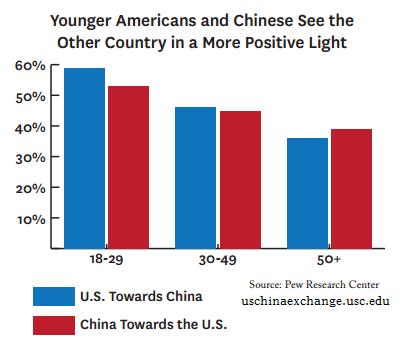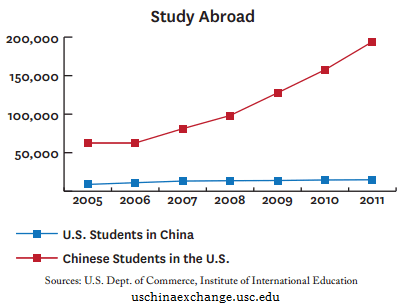The United States and China are more closely connected than ever before, but surveys show that trust between the two countries has declined in the last three years. At a time when global collaborations are crucial for tackling issues like climate change, how can the US and China build trust despite differences in values, politics, and communication styles?

The Millenials offer hope: “While majorities of Americans and Chinese see the other country in a negative light, half of those under age 30 have a favorable impression of the other country,” states the report just released by the USC Annenberg School for Communication and Journalism and the Peking University School for International Studies. The report stresses the importance of engaging young people in “next generation public diplomacy” through new communication platforms and technologies like social media. “There is much energy and attention focused on official Washington-Beijing based talks and too little financial support for and focus on people-to-people engagement.”
As a starting point, the new US-China Exchange website includes a database containing hundreds of past and current US-China exchanges. The website aims to make this information easily accessible to the general public, hoping to grow an informal network surrounding collaborations between the US and China.
The report, titled “Building U.S.-China Trust: Through Next Generation People, Platforms & Programs”, was created by a commission of experts led by USC Annenberg Dean Ernest J. Wilson III and Wang Jisi, director of Peking University’s Institute for International and Strategic Studies. Members of the commission presented the report at USC at an April 22 event moderated by Clayton Dube, executive director of the USC US-China Institute.
“We understand that there are real issues between the United States and China, that our interests don’t always coincide,” said Dube. “But we are optimistic that we can […] find ways to work together, and in so doing, expand our capacity to begin to address these […] pressing issues. Climate change, all of these issues, require the United States and China to get a lot better at collaborating. And that’s what this entire project is about: to facilitate that.”
The USC event featured examples of collaborations between the US and China, including the 2011 Global Exchange Program, which paired students from USC’s School of Cinematic Arts and the Communication University of China to make short documentaries about Los Angeles and Beijing from a global perspective. One of the documentaries, “How to Get an American Girlfriend”, received over a million YouTube views in China:
While film can help bridge cultural differences, Assistant US Attorney Ronald Cheng pointed out that misrepresentations in the media can spread like wildfire. He shared an anecdote that made the audience laugh and nod in agreement: “I was just in China recently, and you could not get away from any conversation without hearing the words ‘House of Cards.’ And it is the one thing that the US doesn’t even have to lift a finger to do in order to spread its impact, and yet it is probably the source of the greatest misunderstanding about the United States.”

Dr. Ren Sun, UCLA Associate Vice Chancellor for Internationalization, discussed a successful foreign exchange program organized by UCLA’s Cross-Disciplinary Scholars in Science and Technology and Zhejiang University, as well as a recent collaboration between UCLA and Centre Testing International Corp. to create a diagnostic lab in China. As UCLA reports, it will be the first joint partnership “between a Chinese company and a U.S. academic medical center to create a specialized laboratory in China.”
The “Building U.S.-China Trust” report will also be presented at the Woodrow Wilson International Center for Scholars in Washington, D.C. on April 24 and the Committee of 100 23rd Annual Conference in San Francsico on April 26.
To further develop trust-building strategies, the U.S.-China Bi-National Commission on Enhanced Relations and Trust Building plans to organize “a follow-up to the Obama-Xi Annenberg Sunnylands meeting” in 2015 to involve high level leaders in business, education, and philanthropy from the US and China to “plan programs that utilize Next Generation Public Diplomacy to engage Americans and Chinese in trust-building collaborations.”